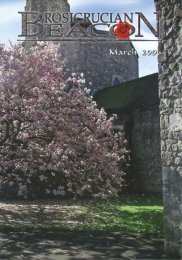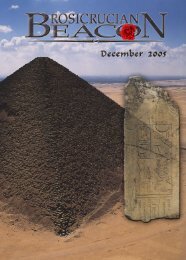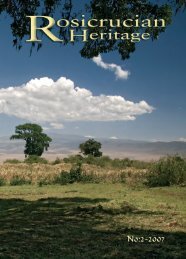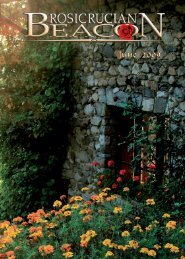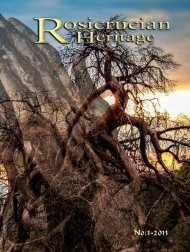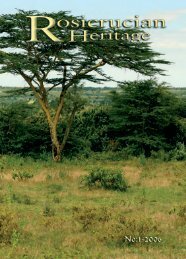Klaas-Jan BAKKER - AMORC
Klaas-Jan BAKKER - AMORC
Klaas-Jan BAKKER - AMORC
Create successful ePaper yourself
Turn your PDF publications into a flip-book with our unique Google optimized e-Paper software.
of the Boer forces in<br />
the Cape during the<br />
Anglo-Boer War. His<br />
experiences instilled a<br />
conviction in him for<br />
conciliation amongst<br />
nations and caused<br />
him to be the only<br />
delegate at Versailles,<br />
the post First World<br />
War Treaty, to plead<br />
for less punitive<br />
<strong>Jan</strong> Christiaan Smuts (1870-1950). measures against<br />
This photograph was from 1919.<br />
Germany, something<br />
which could ultimately have averted the Second<br />
World War.<br />
Holism and Evolution<br />
During a full-time political career in South<br />
Africa he found the time, while in parliamentary<br />
opposition, to write Holism and Evolution in<br />
1926. The theme of evolution dominated his<br />
philosophical thought, but he extended the<br />
Darwinian concept of organic evolution to<br />
the development of greater organised entities,<br />
including that of human activities. Far before<br />
his time, he anticipated the global formations<br />
we have today, of nations grouping in greater<br />
economic and political communities.<br />
Without being consciously aware<br />
of it, individuals in such groupings become<br />
subliminally part of a greater whole, described as<br />
“groupthink” in modern parlance. This reminds<br />
me of the hypotheses of another South African<br />
naturalist, Eugene Marais, who, from<br />
observing the coordinated communal<br />
actions of ants, framed similar ideas<br />
in his Soul of the White Ant. The<br />
exercise of a communal will also finds<br />
expression in the Rosicrucian concept<br />
of an égrégore.<br />
Doornkloof<br />
Smuts was careful not to reveal a<br />
deeper, mystical side to his philosophical thought.<br />
In an Afrikaner society dominated by Calvinism,<br />
this would have been political suicide. However,<br />
the few confidants close to him knew him as a<br />
deeply religious man who, when living on his<br />
farm Doornkloof near Pretoria, would, before<br />
sunrise every morning, climb up the hill on his<br />
farm to commune with the divine. When in Cape<br />
Town, he would regularly ascend Table Mountain<br />
on foot for that same private communion.<br />
Today his home is a place of pilgrimage for<br />
many around the world. As you drive towards<br />
the house you will find no ornamental garden,<br />
only trees and grasses, as he wished it to be.<br />
The building is of corrugated iron, previously<br />
Members of the Pretoria Atrium Group of <strong>AMORC</strong> stand outside<br />
Doornkloof, once the home of <strong>Jan</strong> Smuts on the outskirts of Pretoria<br />
in the Transvaal province of the Union of South Africa. Today it is a<br />
carefully cared for museum in honour of his life and achievements.<br />
officers’ quarters, which were discarded after<br />
the Anglo-Boer War. The interior is of a simple,<br />
practical nature. At the side of the house is a<br />
stoep (veranda) with an iron bed. Here Smuts<br />
slept, even in the middle of winter, with the<br />
drinking water next to his bed frozen in the<br />
morning. Two rooms further on you enter his<br />
study and realise the greatness of this man.<br />
Fluent in German, French, Latin and Greek, the<br />
“Under the double influence of the internal genetic and<br />
external environmental factors life has subtly adapted<br />
itself to the ever-changing situations on this planet...<br />
In the process of this evolution not only new structures<br />
and organs, but also new functions and powers have<br />
successively appeared, culminating in the master key<br />
of the mind and in the growing achievement of human<br />
personality.” (Smuts quoted by Van Wyck).<br />
shelves are lined with the great classics, of which<br />
he had read each one and could quote verbatim<br />
from any page. But the true nature of the man is<br />
found in the trays alongside the books. There you<br />
can find his collection of almost every species of<br />
grass in southern Africa.<br />
Once, during a botanical expedition, a<br />
young botanist asked Smuts where he found the<br />
The Rosicrucian Beacon -- December 2007



